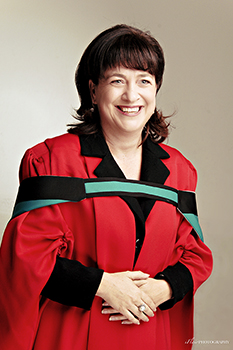Latest News Archive
Please select Category, Year, and then Month to display items
![]()
After South Africa’s battle with the record-breaking drought of 2015, Prof Andries Jordaan from our Disaster Management Training and Education Centre for Africa(DiMTEC) saw room for improvement in dealing with this kind of disaster.
Drought impact
Commercial farmers who are usually net exporters of food crops and communal farmers who own the bulk of the country’s livestock, were all hit hard in 2015. Most of the latter had no resources to spare as the drought progressed. The concern about the drought’s impact on the country’s food production and availability resulted in a joint goal of preventing food scarcity during future droughts.
Prof Jordaan’s visit to the National Drought Mitigation Center (NDMC) in Lincoln, Nebraska, in the US, several years ago prepared him to better equip communities in South Africa to deal with drought situations. “I recognised that in spite of the impact DiMTEC has been able to make on disaster preparedness, a gap remained in disaster response in South Africa.”
Sharing knowledge
In August this year Prof Jordaan again visited the NDMC. This time he requested a few key players in South Africa’s agriculture and disaster response communities to join him. With him were Janse Rabie, head of Natural Resources at AgriSA, a nonprofit organisation that functions as an interface between the government and about 28 000 South Africa farmers, and Moses Musiwale Khangale, director of Fire Services for the South African Ministry of Cooperative Governance and Traditional Affairs.
The South African delegation met with and learnt from climatologists, geospatial technologists, and outreach and planning analysts.
First Dementia Care Mapper in Africa receives international award
2015-11-17

The first Dementia Care Mapper from Africa,
Dr Sanet du Toit.
Photo: iFlair Photography |
“In one facility, four elders who needed minimal assistance to eat were provided with an opportunity to sit at a separate table, and enjoy their breakfast as preferred – that is, to spread bread with butter, jam or marmite; to add their own milk and sugar to their tea.”
Dr Sanet du Toit described a scenario where staff members at an old-age home implemented recommendations she made following an observation she conducted.
“We do not think twice about doing this but, within institutional care settings, these ’normal’ routines are often replaced with practices that could be viewed as ‘time savers’. For example: everyone gets milky, sweet tea to drink,” she explains.
Yet, by creating an environment where the elderly living with dementia were at liberty to determine the amount of milk in their tea, active participation meant an improved well-being.
She was honoured with the International Association of Homes and Services for the Aging (IAHSA) Award for Excellence in Applied Research on 1 September 2015, at a joint conference held by the Aged & Community Services Australia (ACSA) and IAHSA in Perth.
This exceptional Occupational Therapist from the University of the Free State (UFS) emerged as the first Dementia Mapper from Africa. Dementia Care Mapping is a method used internationally to assess with the purpose of improving the quality of care given to residents in institutionalised settings.
The IAHSA award acknowledged her person-centered care training and research in South African residential care facilities while working at the UFS as a senior lecturer from 2003 to 2013. Currently, she is based at the University of Sydney, but remains an affiliated lecturer at the UFS Department of Occupational Therapy.
In 1992, she graduated with a BA in Occupational Therapy at the UFS, and went on to further her studies at various institutions. Also, she is one of the founding directors of the Eden Alternative South Africa, an advocacy for older persons’ rights within old-age homes. Over the years, Dr du Toit has won numerous awards for her research.